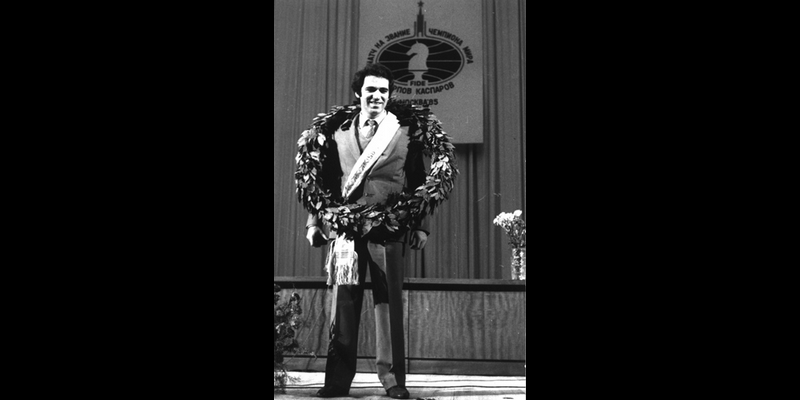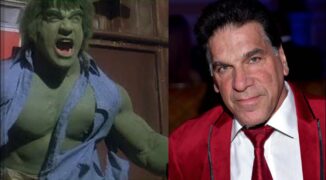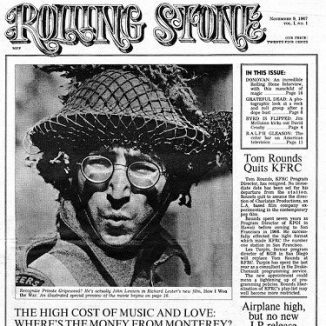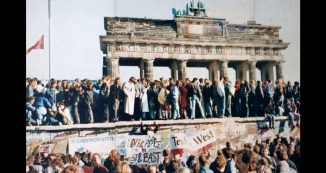48 years ago today, Gary Kasparov won his first Chess World Championship after overcoming his opponent Anatoly Karpov whom he faced inconclusively the year before in what was and still is the only world championship ever abandoned without a result. Kasparov secured the world crown in Moscow by a score of 13–11 making him the youngest champion in history at just 22 years of age, and began a reign of dominance that ranks him among the best in history. READ what happened next… (1985)

The Kasparov-Karpov rivalry was to play out in four matches across four different world championships from 1984 to 1990, with Kasparov claiming the world title by narrow margins of 12½–11½ in 1986, 12–12 in 1987, and 12½–11½ in 1990.
The win in Moscow set Kasparov on course to eventually hold the record for the longest time as the No. 1 rated player in the world—from 1984 to 2005. At the time of his retirement in 2005, he was still ranked No. 1 in the world, with a rating of 2812.
Kasparov holds the record for most consecutive professional tournament victories, placing first or equal first in fifteen individual tournaments from 1981 to 1990.
MORE Good News on this Day:
- Albert Einstein was awarded Nobel Prize in Physics for photoelectric work (1921)
- Cambodia gained independence from France (1953)
- Elvis Presley’s hit Hound Dog became only the third single to sell three million copies in the US—with the others being Bing Crosby’s ‘White Christmas’ & ‘Rudolph The Red Nose Reindeer’ by Gene Autry (1958)
- Simon and Garfunkel recorded what would become their signature tune ‘Bridge Over Troubled Water’—with Art joining on vocals, at Paul’s insistence (1969)
- A result of a popular revolt, Nepal issued a new democratic constitution that brought multi-party democracy, lifted the ban on political parties, described a democratic representative system, curtailed the authority of the king, and enshrined fundamental rights (1990)
- Mozilla Firefox 1.0 released, the fastest, safest browser on the internet at that time (2004)
110 years ago, Hedy Lamarr, the Hollywood megastar and telecommunications expert, was born. Lamarr is one of the most remarkable women of the 20th century, and has been described as one of the greatest actresses of all time. Alongside George Antheil, a musical composer, Lamarr developed a radio-wave guidance system that was hoped to allow Allied torpedoes to break through the Nazi’s radar jamming systems, but led to the invention of Wi-Fi and Bluetooth instead.

Hedy Lamarr had a successful film and theater career as an actress in Austria, including for an award-ridden portrayal of Empress Elisabeth of Austria in Sissy (1933). Dark clouds gathered over Europe at the time, and as the daughter of two Jewish parents, Lamarr decided to leave her rapidly Nazified home.
Fleeing Vienna and her oppressive husband who himself had connections to both Hitler and Mussolini, Lamarr moved to Paris where she met Metro-Goldwyn-Mayer co-founder, Louis Mayor who offered her a Hollywood contract. Her MGM films include Lady of the Tropics (1939), Boom Town (1940), H.M. Pulham, Esq. (1941), and White Cargo (1942). Her greatest success was as Delilah in Cecil B. DeMille’s Bible-inspired Samson and Delilah (1949)
Lamarr had picked up tinkering from her father, and during World War II she read that radio-controlled torpedoes had been proposed for use in the Navy. However, an enemy might be able to jam such a torpedo’s guidance system and set it off course. When discussing this with her friend the composer and pianist George Antheil, also a government munitions inspector, the idea was raised that a frequency-hopping signal might prevent the torpedo’s radio guidance system from being tracked or jammed. They designed this system, which had been extensively explored before, but never patented or produced.
After the torpedo was launched, an airplane would monitor its movement and report course corrections back to the launch ship, which would readjust the torpedo’s path until it hit the target. The radio signal between plane and ship would transmit over constantly changing frequencies so it could not be intercepted or jammed by the enemy, hence “hopping.”
In 2014, Lamarr and Antheil were posthumously inducted into the National Inventors Hall of Fame for this discovery, which was neither used during World War II, nor in subsequent Navy experiments, but put scientists on track to develop cellular communications, Wi-Fi, and Bluetooth, which all use essentially the same technology of “frequency hopping.” (1914)
Happy 73rd Birthday to Lou Ferrigno, the body builder who became a household name for starring in The Incredible Hulk television series in the 1970s and 1980s.

But the two-time Mr. Universe and fitness icon always had one weakness—his hearing. After ear infections as a toddler left him with major hearing loss, Ferrigno spent years wearing bulky hearing aids. Along with a speech impediment, he was often bullied by other children and he began reading Hulk and Spider-Man comic books and dreamed of being strong enough to defend himself. He started weight training at age 13 using a broomstick and pails filled with cement because he couldn’t afford to buy weights.
But, Ferrigno says his hearing loss gave him a determination that served him well. “I think that if I wasn’t hard of hearing I wouldn’t be where I am now… It gave me a certain strength of character.”
In 2020, at 69, he underwent cochlear implant surgery, and the results brought the still-muscular man to tears. WATCH the moment that, like the Hulk, was incredible… (1951)
Ferrigno has also starred in films, like Sinbad of the Seven Seas and Hercules.
And, 56 years ago today, the first issue of Rolling Stone magazine was published in San Francisco, featuring a photo of John Lennon on the cover dressed in army fatigues.
 A 21-year-old Berkeley dropout named Jann Wenner had a big idea—to start a rock & roll magazine. As the newspaper‘s founder, he pioneered the field of rock journalism. (1967)
A 21-year-old Berkeley dropout named Jann Wenner had a big idea—to start a rock & roll magazine. As the newspaper‘s founder, he pioneered the field of rock journalism. (1967)
34 years ago today, Communist-controlled East Germany opened the gates of the Berlin Wall allowing its citizens to freely travel into West Germany—and the unending freedom that entailed.

After 28 years of separation, cheering East Germans surged through at midnight, met by jubilant West Berliners on the other side. Ecstatic crowds clambered up the Wall, danced on the top, and hacked off chunks with hand tools. The Berlin Wall had fallen, and with it, Communism—which was crumbling in East Germany as well as the Soviet Union. (1989)

And, on this day in 1993, the Dave Matthews Band released their first album, ‘Remember Two Things’. Mostly live tracks, three of the songs “Ants Marching”, “Tripping Billies”, and “Satellite” appeared on later LPs and became fan favorites still played for concert-goers a quarter century later.
After launching on their own indie label, Bama Rags, the Virginia band went on to sell more tickets and earn more money during 2000-2010 than any other act in North America. WATCH how the band weaves a sax and violin into their unique brand of country style rock and roll in Tripping Billies on this album, with live scenes added: “Such a happy human race.”
SHARE The Milestones, Memories, and Music…




















[…] Read More […]
[…] post Good News in History, November 9 appeared first on Good News […]
[…] post Good News in History, November 9 appeared first on Good News […]